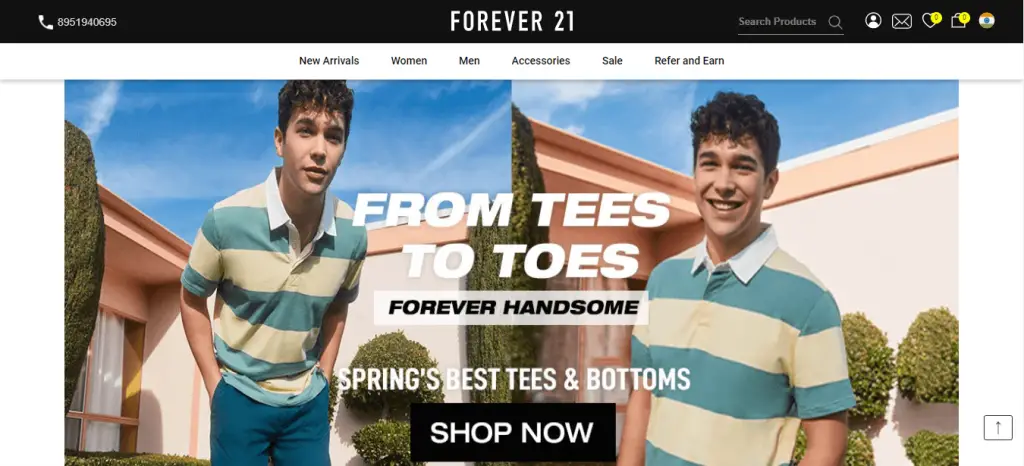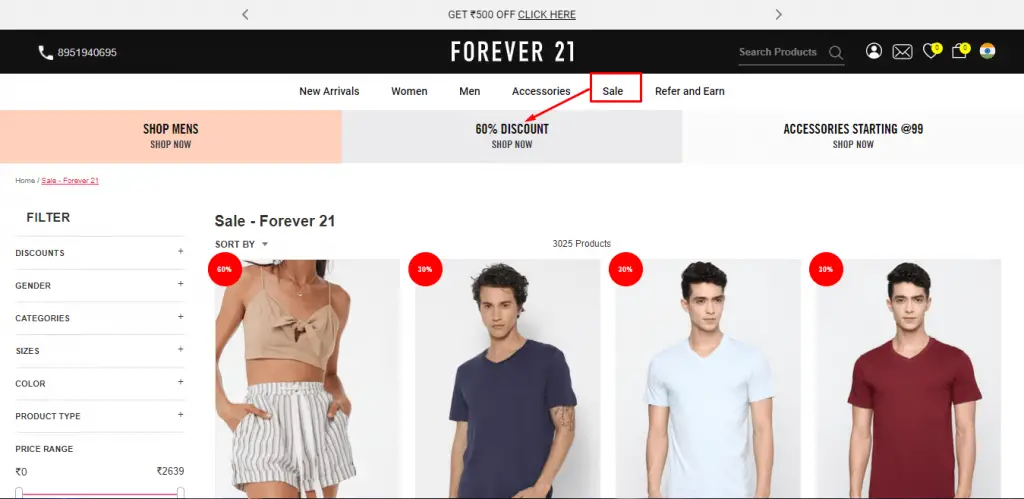Forever 21 offers extremely cheap clothing due to its fast-fashion business model. It emphasizes low-cost production, quick turnover of styles, and economies of scale to keep prices low. However, this may result in lower quality and ethical concerns in the fashion industry.
A Brief History Of Forever 21 Fashion Brand

The journey of establishing the Forever 21 brand as a world-class fashion house started way back in 1984 by two Korean immigrants; Do Won Chang and his wife Jin Sook Chang. The couple arrived in the US in 1981, and like any other poor immigrant, Don Won Chang worked tirelessly to take care of his family and make ends meet. Do Won Chang worked at a coffee shop, gas station, and even as a janitor. These young Christians had an undying passion for fashion.
Forever 21 brands opened its first store in 1984 in Los Angeles, California. Originally the brand was known as Fashion 21, which targeted kids and teens Korean designs for Korean American communities living in Los Angeles. Soon buyers from all over the US flocked to the stores to take advantage of the cheap trendy fashion clothing, and over the years, Chang realized there was a need for more stores to cater to the increasing demand. First-year in business fashion 21 did marvelously well with over USD 650000 in sales.
After six years, the Fashion 21 brand changed to the Forever 21 brand. When asked why the change to Forever 21, Chang said, “The old want to be 21 again and the young want to be 21 forever.” What a brand!
The 6 Reasons Why Forever21 Clothing Is Amazingly Cheap?

Here are the reasons why Forever 21 clothing is amazingly cheap:
Cheap Labor
Forever 21 Clothing brand makes cheap clothing from developing countries like Bangladesh, Vietnam, China, and Cambodia, where young women and children work in unfavorable conditions. It is believed they work under forced labor where the minimum wage is below 1$ per day.
Labor in these countries is affordable, thus cutting down the cost of production. Thus, it comes down to the consumer as an affordable product.
Cheap Materials
To keep up with the high demand for new trendy fashion, the Forever21 clothing brand outsources cheap materials that don’t last long, especially if washed with hard detergents, which easily fade away.
Cost Margin
Cost margin is one of the key reasons why this brand is cheap.
Forever 21 clothing brand is a fast-fashion brand that makes the latest fashion designs presented on runways during fashion week. To keep up with the pace of new fashion, they quickly make large quantities of low-cost material clothing.
This is how it works; Forever 21 buys bulk materials at wholesale price. Since clothing production is done in bulk, a negotiating team negotiates for low manufacturing costs with the manufacturers. It is cheap to produce quantity in a manufacturing world rather than just a few pieces.
The chain of production cost is minimized as it is passed down to the consumer, who will buy the product at a low price compared to other brands.
The cost margin is also highly affected by the local currency. The value of local currency where production is done in emerging countries is low compared to the dollar value. This means forever 21 Clothing will pay less in production costs than other brands that produce in the USA.
Cheap Designs
To make the new trendy designs earliest Forever 21 production lead is so constrained, and artistry may not be of the best quality designs.
The market niche and target market are young women who buy a lot like the fashion changes and keep up with the demand and competition to have new fashion. They end up making cheap designs.
Many Outlets
Forever 21 has more than 700 stores globally. With this many stores, it buys bulk product volumes and then cuts the margin to pass savings to its customers.
The recent introduction of its new F21 Red chain, which sells basic clothing at discounted prices to Forever 21, is another genius way to draw more customers to the brand.
New merchandise arrives every day in stores, unlike other competitors in this industry like Zara, which arrives only twice a week.
It takes up to six months to complete production from the design to the store shelves. Still, with Forever 21, this time is reduced to a few weeks because exclusive use of the newest trendy designs showcased during fashion runways is duplicated and sold even before the originals hit the market.
E-Marketing
Forever 21 has embraced online and mobile technology by launching a website for online shoppers. This technology has enabled the chain to reach out to many shoppers regardless of their location. A large portion of sales comes from online shoppers.
Where does Forever 21 get their clothes from?
- Forever 21’s Own Manufacturing Units
Among the primary sources for Forever 21’s clothes is their own manufacturing units. The retail giant, established in 1984, has an extensive supply chain that includes multiple private-label manufacturers. The company is involved in all stages of clothing production, from design to manufacturing. - Domestic Suppliers in the USA
Forever 21 has a long-standing association with domestic suppliers within the USA. It is recognized for its quick turnaround in terms of clothing production and trend adaptability, largely facilitated by its strong relationships with these local suppliers. They contribute to the vast array of clothes you find in the Forever 21 stores. - Overseas Manufacturers
Forever 21 also sources its clothes from a variety of overseas manufacturers. This includes suppliers from countries like China, India, and Bangladesh where production costs are lower. This allows the brand to maintain its affordable pricing strategy. - Design Collaboration
In addition, Forever 21 partners with different designers and celebrities for various fashion lines and collections. Through such collaborations, they incorporate unique and trendy designs, adding a touch of exclusivity to their clothing range. - Contract Based Clothing Manufacturers
Even though the company has its own manufacturing facilities, it still relies on contract-based manufacturers to meet its supply demand. Forever 21, due to its vast range of products, utilizes third-party manufacturers to ensure product availability, diversity and meet seasonal demands.
| Source | Description |
|---|---|
| Own Manufacturing Units | Production facilities owned by Forever 21 |
| Domestic Suppliers | Local suppliers within the USA |
| Overseas Manufacturers | Suppliers from countries like China, India, and Bangladesh |
| Design Collaborations | Partnerships with different designers and celebrities |
| Contract Based Manufacturers | Third-party manufacturers to meet demand |
In conclusion, Forever 21 has an extensive procurement process that involves reliance on various sources, both from within the company and external suppliers. This enables the company to maintain supply chain efficiency, uphold product diversity, and retain its fast-fashion brand image.
The Forever 21 Sub-Brands
The Forever 21 Brand is divided into eight other sub-brands to cater to all customer tastes, sizes, and styles. The exciting and stylish trend fashion clothing is sold in stores ranging from small stores of around 900sq.ft to large stores ranging 162000 sq. ft.
Below are Forever 21 sub-brands;
Riley Rose– This is the latest brand opened in 2017 by founders Linda and Esther Chang, majoring in the beauty and home decor items sector. Riley Rose stores offer various products like natural skincare, hair care products, makeup, Korean beauty products, accessorizing beauty products, candy, and current home decor goods.
The introduction of this brand was widely accepted in the market as it targeted the young millennial, and this is seen by the rapid expansion from one store to eleven stores by the first quarter of 2018.
Forever 21 Red– This brand was founded in 2015 to offer ‘discounted’ Forever 21 clothing for all genders.
Forever 21 Lingerie-founded in 2007, this brand offers intimate, sexy lingerie pieces.
Forever 21+ -This is a unique line for plus-sized women to allow them to enjoy trendy fashion at affordable prices like the rest of the shoppers.
The Gadzooks-This line sells casual clothing, shoes, and accessories for women 16 to 22 years old.
21men– This line is designed to provide men in their mid-20s with trendy, stylish fashion. It was formerly known as Heritage 1981 Men’s.
For Love 21– This brand offers a taste of French-style boutiques for women’s accessories, cosmetics, trendy handbags, etc.
Love21 Contemporary brand is for women above 21 years old and is offered at the same price as the other Forever 21 brands.
In-Depth Analysis Of Forever 21 Brand
This fast-fashion brand has conquered the world with amazing designs and styles with its coverage in each continent. Strategic locations for Forever 21 stores have enabled the brand to reach a targeted clientele base and have also created brand awareness leading to more demand, thus opening more stores.
Forever 21 brands have been able to meet customer needs time with its stores always fully stocked with the current trendy styles. This ability is attributed to its culture of buy-it meaning they make what is trendy, and as we know in the fashion industry, changes are drastically inevitable. For this reason, new stock of merchandise arrives daily, with stores selling over 20% of its stock in a week.
Forever 21 brands continue to expand and have recently partnered with GGP, a real estate company letting and leasing spaces to open at least 10 more outlets in their top-tier locations.
Is Forever 21 a fast fashion brand?
Forever 21 and Fast Fashion:
Forever 21 is often classified as a fast fashion brand due to its business model. The brand frequently introduces new styles and collections, identifying with the common attributes of fast fashion – quick production, constant updating of collections, and affordability.
Rapid Turnaround Time:
One characteristic that aligns Forever 21 with fast fashion is its rapid turnaround time. The brand can quickly transition from design concept to garments on store racks, thereby frequently updating its collection.
Affordable Pricing:
Forever 21 offers clothing and accessories at relatively low prices, another common characteristic of fast fashion brands. By providing trendy items at accessible prices, the brand caters to consumers seeking to continuously update their wardrobes.
Mass Production:
Like many fast fashion retailers, Forever 21 relies heavily on mass production. This allows the brand to maintain a steady flow of fresh designs and keep up with fluctuating fashion trends.
So, Forever 21 is a fast fashion brand due to its business strategies that align with defining characteristics of fast fashion, including mass production, rapid turnover of designs, and affordable prices. However, it’s crucial to acknowledge the implications this has on environmental sustainability and labor rights.
References:
https://www.businessinsider.com/the-secret-behind-forever-21s-dirt-cheap-clothing-2012-2
https://www.quora.com/Why-is-Forever-21-clothing-so-cheap

